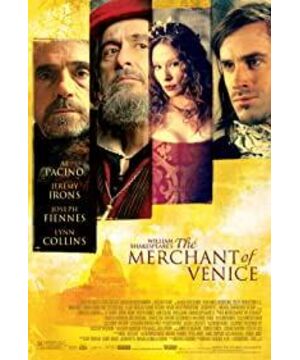It is rare to see Shakespeare's dramas that are both good and bad. Al Pacino's performance is definitely five-star, which shows that at least the director has worked hard to correct the old-fashioned understanding of this Shakespeare play, and it has been quite successful. But in turn, the other side of the play has become completely comedic: the flashy words and deeds of Lorenzo and Gratiano, on the one hand, are in sharp contrast with Shylock’s sadness and on the other hand with Antonio’s sorrow, which increases The tragic nature of "The Merchant of Venice". But the problem is that the wisdom and kindness represented by Portia quickly turned from a comedy of courtship to a farce. This is obviously not the director's intention. Even if the poor performance of Lynn Collins is not the only reason, it is also the most important reason. I don't know why someone would praise her. Her performances (and her servants) are frivolous and vulgar, and are completely in harmony with the corrupt life of the Christians throughout the play. At the end, seeing her clever and lacking in-depth body movements, I can only believe that Bassanio's comparison of her to Brutus's Portia is Shakespeare's irony. The result of this is that, as opposed to the heavy Jewish life, the lives of all Christians are completely slutty and boring modern lives. These people are full of self-righteous moral high-profile, but they don't know anything about friendship, love, law, compassion and wisdom. When Shylock of Pacino was finally overwhelmed by these villains, we can only feel that this drama is not a complex work combining tragedy and comedy in the most profound way in Shakespeare, but, like Troilus and Cressida, it belongs to Shakespeare's darkest tragedy. In the end, Jessica's regret came too late, increasing rather than reducing this dramatic effect. However, the director’s vulgar and frivolous performance of modern life (in order to achieve this goal, the film became R-rated), whether it was intentional or imaginative, especially the use of masks, created Bosch style. The scene makes Shylock's final meat cutting behavior seem very reasonable. If the main purpose of the director is to be afraid of an anti-anti-Semitic movie, even if you believe in Shakespeare, then you can believe that this is one of the best modern Shakespeare plays.
Jeremy Irons's performance is in the middle of the standard, but unfortunately in this too one-sided scene, he does not have the space for Pacino to play. Therefore, the final court scene did not have the kind of real heavyweight confrontation I expected. Joseph’s performance was a bit dilemma. It seems that I don’t know whether he should be more serious like Antonio or more frivolous like his friends, but anyway, he tried to prove that he and Portia are a good match, no matter what. How hard it is to do.
View more about
The Merchant of Venice reviews











